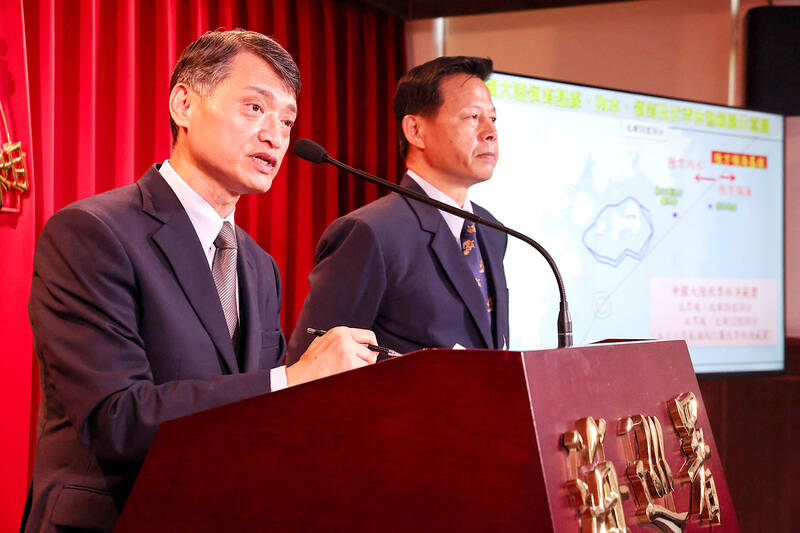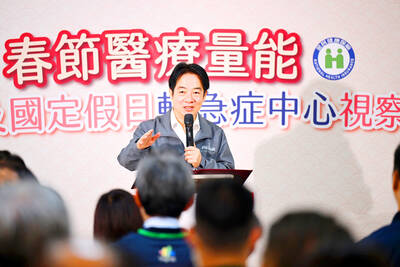The Coast Guard Administration (CGA) yesterday linked China’s seizure of a Taiwanese fishing vessel illegally operating in its territorial waters to Beijing’s new regulation authorizing the China Coast Guard to seize boats in waters it claims.
Chinese officials boarded and then seized a Taiwanese fishing vessel operating near China’s coast close to Kinmen County late on Tuesday and took it to a Chinese port, the CGA said.
The Penghu-registered squid fishing vessel Da Jin Man No. 88 (大進滿88) was boarded and seized by China Coast Guard east-northeast of Liaoluo Bay (料羅灣), 17.5 nautical miles (32.4km) from Taiwan’s restricted waters off Kinmen, the CGA said in a statement on Tuesday night.

Photo: I-hwa Cheng, AFP
The vessel was intercepted by three China Coast Guard vessels at 9:14pm, and the CGA sent three ships to try to rescue it, but they had to stop to avoid “escalating tensions” after China sent reinforcements, the statement said.
CGA Deputy Director-General Hsieh Ching-chin (謝慶欽) told a news conference that the vessel filed a report at 8:14pm, while it was operating in China’s territorial waters 11.2 nautical miles from Shenhu Township in China’s Jinjiang City — an area where Beijing has declared a “fishing moratorium” from May 1 to Aug. 15.
The CGA used its automatic identification system and confirmed there were other Taiwanese vessels operating in the area while it was handling the incident, CGA Coastal Control Division head Liao Yun-hong (廖雲宏) said.
According to the report filed by the Da Jin Man No. 88, the China Coast Guard had warned them with broadcasts before boarding the ship, Liao said.
“We hope that the Chinese side will tell us as soon as possible the reason for the inspection,” Hsieh said. “We will ask the Chinese side through various channels to release the boat and its crew as soon as possible.”
He said the detained crew of Da Jin Man No. 88 consisted of two Taiwanese and three Indonesians, and that in previous cases, fishers had been released after paying fines when operating during China’s no-fishing season.
China has stepped up harassment of foreign vessels after its new regulation took effect last month and this harassment has increased not just in terms of the number of incidents, but also in terms of force used, Hsieh said.
He cited the intrusion on Tuesday by three China Coast Guard ships into waters off the Japan-controlled Diaoyutai Islands (釣魚台群島), known as the Senkakus in Japan, which China and Taiwan also claim.
Hsieh was referring to China Coast Guard Regulation No. 3, which took effect on June 15. The regulation allows the China Coast Guard to board and hold vessels in disputed waters it claims, and to question and detain foreign nationals found to have violated its “exit and entry rules” for up to 60 days.
“We would like to put out a special reminder to our fishing vessels and other ships passing through nearby waters to be wary,” he said, adding that the CGA would step up efforts to escort Taiwanese fishing vessels.
“The coast guard also calls on the mainland side not to use political factors to handle this situation,” Hsieh said.
The Mainland Affairs Council said it would contact Chinese authorities to seek an explanation of what had happened and “dispel unnecessary speculation.”
Indonesian Ministry of Foreign Affairs’ Protection of Citizens Division director Judha Nugraha said the country’s consulate general in Guangzhou, China, would assist the detained Indonesians.
Meanwhile, Hsieh said there had been a step-up in the China Coast Guard’s enforcement of its closed season for fishing this year, which “marked a break from the past.”
In addition to the Da Jin Man No. 88, the China Coast Guard has repelled 138 foreign fishing vessels, boarded 14 and held one vessel along with its crew of 10 in that time, he said.
Before Tuesday’s incident, there had been three instances involving 17 Taiwanese fishing vessels being boarded and seized by the China Coast Guard since July 11, 2003, Hsieh said.
The latest incident occurred on July 28, 2007, he said.
The 17 ships were held because they violated China’s closed season for fishing. A total of 11 were released after paying fines and six were allowed to leave on the spot following negotiations between the CGA and its Chinese counterpart, he added.

NON-NEGOTIABLE: The US president’s action ran counter to one of the US’ ‘six assurances’ on not consulting China about arms sales to Taiwan, US lawmakers said US President Donald Trump’s admission that he is discussing arms sales to Taiwan with Chinese President Xi Jinping (習近平) is “alarming and a blatant violation of US policy and the six assurances,” US Representative Ro Khanna said on Tuesday. Trump on Monday said he would decide soon on whether to send more weapons to Taiwan, after Xi warned him not to do so. “I’m talking to him about it. We had a good conversation, and we’ll make a determination pretty soon,” Trump told reporters aboard Air Force One when asked about warnings raised by Beijing during a phone call with Xi over

REAL EMERGENCIES: To avoid overcrowding, the health minister urged people with mild or moderate symptoms to go to UCCs, while the ER should be for critical cases President William Lai (賴清德) yesterday inspected the nation’s Lunar New Year medical preparedness with a visit to an urgent care center (UCC) in Taipei and expressed confidence in the Ministry of Health and Welfare’s plans to prevent emergency room (ER) overcrowding during the nine-day holiday. The ministry in November last year launched a pilot UCC program to provide urgent medical care at 13 clinics in the nation’s six special municipalities over weekends and on holidays, aimed at relieving pressure on crowded ERs. To ease ER overcrowding during the Lunar New Year, when most hospitals and primary care clinics are closed, the National

HOLIDAY RUSH: Airport passenger volume is expected to reach a new high, while southbound road traffic would likely peak from Tuesday As Lunar New Year travelers flock overseas, passenger traffic at Taiwan Taoyuan International Airport is expected to shatter records, as Taoyuan International Airport Corp (TIAC, 桃園國際機場), Taiwan’s largest aviation hub operator, projected yesterday’s passenger volume to climb to 167,000. The figure comes after a record single-day high of 161,000 passengers on Thursday, and would surpass the previous pre-COVID-19 pandemic Lunar New Year peak of 166,000 passengers in 2019, TIAC said. Long lines could be seen forming as early as 7am yesterday, filling Terminal 1 of the airport almost to capacity, yet security checks took only 10 to 15 minutes. TIAC urged

VACILLATING? Some US officials are concerned that Trump’s April visit to Beijing might be affected if Washington pushes through additional weapons sales to Taiwan A major US arms sales package for Taiwan is in limbo following pressure from Chinese President Xi Jinping (習近平) and concerns among some US officials that greenlighting the deal would derail US President Donald Trump’s upcoming visit to Bejing, the Wall Street Journal (WSJ) reported on Wednesday. Trump on Monday said that he would decide soon on whether to send more weapons to Taiwan, after Xi warned him not to do so. “I’m talking to him about it. We had a good conversation, and we’ll make a determination pretty soon,” Trump told reporters aboard Air Force One when asked about warnings raised